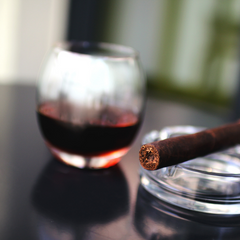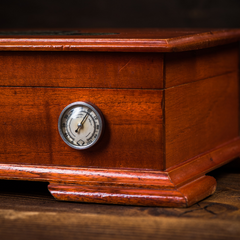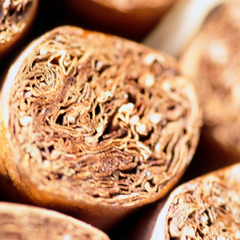How Moisture and Humidity Affect Your Cigars

Cigar smoking is a source of enjoyment for many, but for the best experience, cigars need special care. Heat and humidity have a negative effect on cigar quality, which can result in loss of flavor, drying or cracking, mold growth, or even devastation of your collection by tobacco beetles.
To preserve richness and taste, it’s essential that humidity levels are maintained. Cigars absorb and retain moisture from the surrounding area, but can also dry out if not kept at an optimal moisture level: 70 degrees Fahrenheit and 73-74 percent RH (relative humidity).
If you find your cigar quality is lacking, it may not be the brand. Dry cigars are brittle; if you hear any cracking, then you know the cigar is too dry. If the cigar feels spongy and soft, then it’s too damp.
Here’s more information to help diagnose your problem, and some information on how humidity will affect your cigar's burn and flavor:
Not Enough Cigar Humidity

A good cigar should burn slowly and evenly at a low temperature, allowing the tobacco’s sugars and oils to blend and consistently release a smooth flavor and aroma. A cigar’s moisture level is what ensures this proper burn. Dry cigars burn fast and hot. If your humidity is too low your cigar wrapper will be brittle, and your cigar will burn quickly and give off a bitter taste. It will burn hot with too much smoke, hindering your enjoyment of the subtle flavors a good cigar provides.
Cigars are meant to burn evenly, at a low temperature. A slow burn allows the oils and sugars in the tobacco to blend together, so you can enjoy the layers of flavor.
A hot sun or even a strong wind can cause a cigar to dry out in just a few hours, losing flavor through evaporation of its essential oils.
So you’ll need to keep your cigars moist -- but not too moist.
Too Much Cigar Humidity
If your humidity is too high, the cigar will swell and restrict air flow throughout. This additional moisture washes out the flavor and overloads your palate with dense smoke.
A good cigar is usually rolled with several kinds of tobacco that are layered to burn and blend together. Poor air flow prevents a cigar from burning evenly, causing one of the flavors to overwhelm the rest – definitely not pleasing to your palate.
If one part of your cigar burns faster than the rest, this is known as tunneling, canoeing, or running. When any of these occur, the oils and flavors will not mix in the way they were intended. Instead of a complex and layered smoke, you experience the cigar as simplistic and dull.
It doesn’t take long for a cigar to dampen as it absorbs moisture from the air. Just a few minutes in heavy rain is enough to ruin a cigar’s moisture level, even if you’re under cover.
Keeping your cigar from absorbing too much humidity is important not only to maintain its quality, but also to prevent your entire cigar collection from being destroyed.

Mold Growth

Too much humidity can cause mold growth, ruining the cigar and possibly all others stored with it. You may see fuzzy spots on the wrapper, or white, green or gray patches on the cigar, but that distinctive musty smell is a sure sign of mold. You’ll need to dispose of any moldy cigars, and clean your storage vessel thoroughly.
Do not confuse mold with bloom, however. Bloom (or plume) causes fine dusty spots on a cigar when the oils in a tobacco leaf crystallize and rise to the surface. It is easily dusted off with your finger, and is an indication that your cigar has been stored properly and has reached an optimal time to smoke.
Cigar Beetles
You may find small, pin-sized holes in your cigar wrappers after they have been stored in warm, humid conditions. These holes are indicative of a beetle problem. If brown tobacco dust falls out when you tap the end of the cigar against a table, you have a beetle outbreak.
Tobacco beetles are tiny insects that thrive when the temperature is damp and warm. They feed on tobacco leaves and will destroy your entire cigar collection if you don’t act quickly. Cigars with holes should be disposed of immediately; unaffected cigars can be placed in a zippered plastic bag and placed in the freezer for three days, then moved to the refrigerator for another day to prevent shock from changing temperatures.
Wash your humidor thoroughly with a damp cloth, check the gauges, and consider your storage location to prevent another infestation.
Optimal Cigar Storage
The best way to protect your cigar collection from drying out or becoming damp is to store them in a cigar humidor. Humidors are designed to reproduce the humidity level of their country of origin; these sealed vessels allow to you adjust and maintain optimal humidity levels for your cigars.
Buying a Cigar Humidor
Be sure to purchase the right size; an overcrowded humidor will dry out its contents, and an empty one is hard to balance the humidity. Do not keep your cigar humidor in a warm or very cold room, and avoid direct sunlight, as this will keep the humidor from maintaining the correct levels.
If you’re a casual smoker that doesn’t keep enough cigars to justify purchasing a humidor, preserve the moisture levels of your cigars by storing them in a plastic zippered bag inside another bag with a dampened sponge.
Plastic boxes are another place to store cigars. They will hold moisture as well as the plastic bag, just be sure to place the sponge in an upright plastic bag to avoid it touching the cigars.
If you plan to store cigars for more than just a few weeks, give some thought to how you’ll keep them fresh. With just a bit of care to ensure your cigars are properly stored, they’ll be ready to enjoy the next time you want to relax with a good smoke.

